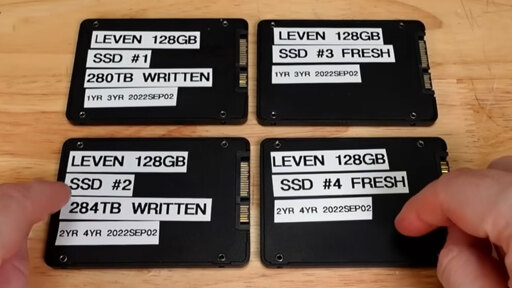More proof that tape drives aren’t going anywhere, despite what Elon thinks.
You may not know it, but SSDs will lose data after a period of time if they are simply left unplugged, which can be a serious threat to your data if you store backups or precious files on unplugged SSDs. A year-two update on the how long can SSDs store data unpowered video series is another reminder about the importance of regularly refreshing your backups with a bit of juice. The tests consist of storing data on an SSD and then leaving it unplugged for years to see the impact on the stored data.
A year-two update on the how-long-can-SSDs-store-data-unpowered video series
Absolute banger of an example of a sentence that needs more hyphens. The author was kind enough to say “year-two”, but then tortured us with trying to figure out the rest of the sentence.
Absolute banger-of-an-example-of-a-sentence that needs more hyphens.
In German we call that EinabsolutesKnallerbeispielfüreinenSatzdermehrBindestrichebraucht.
Oh yeah, we call it that in Canada too
WHAT! 😳
SSDs are basically slow RAM.
/s
So what exactly would just powering up the ssd do? As long as i don’t rewrite all cells those are still in a low power state aren’t they? Or would it be enough to just check the entire disk once ny crystaldisk or something?
I had no idea this was a thing. It is not a good thing.
Isn’t leven the absolute bottom of the barrel for an SSD?
(Aside from the ones on eBay where you don’t even get half the advertised capacity)
very very old news
no storage drive on the planet last more than two to three years and just like batteries go bad just sitting like everything else been a problem that people refuse to acknowledge like everything else
actual problem is finding storage on not only more durable longer lasting drives but also ones that use materials and resources that are more sustainable
HDD drives absolutely don’t just “lose data” as it ages. The issues can be the drive head or motor, but the platters themselves can be placed in a new hdd and it works perfectly. Tape may be king, but hdd will last ages.
lol sure. They are magnetic charges on a disk. The disk is not a permanent magnet. This means that the charge will eventually dissipate. Also platters cannot be just placed in a new drive and work perfectly. The firmware and disk hardware has to match. Plus most hdd’s have multiple platters with the data spread out over them. To do what you suggested will most likely cost you a pretty penny to a data recovery company.
I know for a fact it can be done because I used to send drives to companies to do that exact thing. Yes it’s expensive if it needs to be done, but it’s entirely possible.
no storage drive on the planet last more than two to three years
I have a 20+ year old disk hard drive from a desktop I used in high school that I can plug in and still access my files.
And I’m still using a 10+ years old hard drive I had in two previous PCs of mine. I do plan to get some more sophisticated backup methods, like a proper Blu-Ray drive and M-Disks, for long-term storage, as tape drives are more expensive even if the media is actually cheaper.
Not for long. And there is no way that it doesn’t have issues. Also that old of hardware will have connections that modern pc don’t have support for. So basically either the drive will die or the hardware running the drive will. But op is specifically talking about drives that are unplugged, just sitting around. All drives will lose data from being unplugged, and it has been known for a very long time. However they are incorrect on the “no storage drive” can last long. Tape drives are the go to for long term storage. Something like 15-30 year lifespans and 50+ on other types of tape drives.
Person 1: “this thing isn’t possible”
Person 2: it is, and I have experienced it myself.
Person 3: “yeah but here is a list of reasons I just made up why your experience doesn’t matter”
The first comment was not saying “after long enough time certain drives do this/hardware degrades/won’t run in modern machines”, they were blanket stating “no storage lasts beyond 2-3 years”
I was trying to explain that the volatility of a 20+ year old hdd and hardware is very high. If there is important data to you, you may want to get it to a device that is not so volatile. Also it’s not like I made any of this up, I have a decade of it experience including plenty of data recovery. It’s how I know that the “no storage lasts beyond 2-3 years” statement is blatantly false.
I don’t touch the drive for years on end and it works. The connections are IDE and Molex. I have an IDE to USB data cable and a Molex power cable. I can plug it into my PC that I just built a few months ago no problem.
The data on “old” style disk drives is physically etched upon the disk magnetically. That’s why the data still exists, despite sitting unused for long periods of time.
Neither you nor the OP know much about this topic.
I’ve worked it for over a decade at this point, I know exactly what I’m talking about. Sure the drive works now, but it is mechanical and mechanical things WILL fail. Obviously adapters will allow it to interface with modern hardware.
I don’t know if you understand how magnetic drives work. They are not permanent magnets, that means that they will lose their charge unless you maintain the drive. It’s not a matter of if but when. And maintaining the drive means it’s plugged in and spinning, which wears the drive down.
I bet if you ran a smart report on that drive, it will have plenty of “old age” and “pre-failure” on many different attributes. If there is data important to you, then it should not be on that drive.
Explain how a hard disk loses data from being unplugged. More importantly, explain how it retains data specifically while being plugged in.
The data is stored as magnetic charges on the physical disk. They are not permanent magnets. They lose their charge and thus the data, slowly over time, while not being plugged in. A plugged in drive gets electricity to maintain the charge on the disk. How it does it specifically is based on the firmware of the drive. Idk why you can’t just google it yourself and probably find a better and more specific explanation.
They are not permanent magnets. They lose their charge and thus the data, slowly over time, while not being plugged in. A plugged in drive gets electricity to maintain the charge on the disk.
I mostly figured that’s what you thought, and it’s completely wrong. They are permanent magnets. As permanent as any ultra-tiny magnet can be.
Hard drive platters are made of glass or aluminum, and have a thin layer of a metal alloy in which to store a magnetic charge. There is no electricity flowing through the platters of a hard drive, ever. They are 100% passive.
I didn’t google it because I can’t google, “tell me what false belief this person has.”
I never said the platters were electrically charged. The electricity powers the drive which has firmware. That firmware controls the magnetic charges and can correct errors, depending on firmware, hardware, and such. Also you are incorrect. The platters are not permanent magnets. The permanent magnets are a part of the spindle motor. I guess it also depends on how you define permanent magnets. The magnetic material most commonly used, for platters, is cobalt. Where as the “permanent magnets” (for the motor and typically when referring to permanent magnets) are neodymium. Maybe try a search that will actually result you in answers. I had no problems doing so when you challenged my knowledge.
You’re the one making extraordinary claims. You need to back them up. You said the data in HDDs only lasts 2-3 years unless they are plugged in. That is patently false in both ways. No, they don’t, and no, keeping them plugged in doesn’t help what data loss does occur. Error correction occurs when reading the data. And data is only read when asked for.
The firmware doesn’t “control” the charges. They just sit there. When the drive is powered but not in use, it sits there. Nothing is being done to “maintain” the charges.
If you don’t consider a static magnetic charge on a platter to be “permanent”, then no magnet is permanent. The only impermanent magnet is an electromagnet.
no storage drive on the planet last more than two to three years
I’ll tell that to the laptop HDD I pulled out of a laptop last month that hasn’t turned on since 2018 and copied a large portion of the data so my mother can have old family photos she forgot to transfer.
I’m positive there are issues somewhere on it, since radiation is a thing and the HDD case isn’t 6ft of lead. I just didn’t encounter any with the 50-60gb I transferred.
On a long enough timescale, sure. But not a couple years for HDDs at least.
Op is not saying that 100% of the data is lost after that time frame. That’s enough time that you could lose critical areas of sectors in such a way that data becomes unreadable. Yes hdd’s can sit for years without losing much data. However the firmware and os’s are able to handle some lost bits so it doesn’t seem like you lost data.
What do you do, keep them loose in a sack?
Very, very new news to me. I’m glad we have people like you who know everything. I just wish you would share your knowledge more.
This has been known since hard drives have been around. Just because ssd’s work differently, doesn’t mean that they have the same drawbacks as hdd’s when it comes to data retention while sitting unplugged.
Just stop. You have no idea what you’re talking about. You’re the one who needs to google how HDDs work.
You are correct I never went to school to learn about computers (including hardware). I’ve never done data recovery as part of my job. I’ve never once used Google to help me understand what’s going on with hardware, hard drives, solid states, or raid and raid like systems. I’ve never taken apart a hard drive, nor have I destroyed them in accordance to government mandated procedures for a government contractor. I guess I have some Google to do.
/s because I fear some can’t tell the difference
You can make all the claims you want about your training and knowledge. It doesn’t mean you know what you’re talking about.
I’m in first grade, English my third language, and both my parents refused to speak to me for the first 4 years of my life, and even I know you’re wrong.








